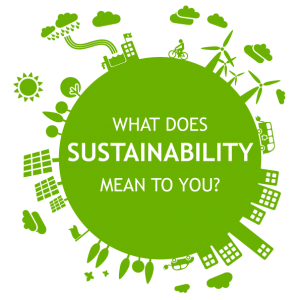Sustainability. We hear such a term often. However, not many know it’s meaning. The more optimistic of us conceptualizes it as movement to a more eco-friendly society. The more pessimistic of us entitles it to a hindrance on normative lifestyles; surrendering the things we value (foods, water use, and electricity) for sole survival of nature. Whether optimist or pessimist, neither of two suffice. The optimist is too forward in his/her generalization of the concept, while the pessimist does not consider the proper values based on stereotype and prejudice toward media’s portrayal of the concept. Falling too far on either side of the optimistic-pessimistic spectrum can be hindrance on sustainability itself.

Allow me to provide a scenario.
A girl and guy, who have never previously met, are sitting down for lunch. The guy orders a large hamburger with bacon and every other meet one can think of. However, the girl orders a small salad. Noticing guys ‘meatful’ meal, the girl is prompted to discuss the harms of the foods that he is eating. The girl proceeds to discuss the horrors of GMOs and factory farming. Not only does she criticize his diet, she begins discussing the importance of sustainability, barring on the fact that the guy is not being sustainable in his food choice.
There are a few things wrong with this picture.
The girl is the optimist. She understands the value of being eco-friendly and feels the need teach others the same. However, she seems to think that the idea of eating meats is unsustainable and expresses that notion to the guy. The guy is the pessimist. He doesn’t quite understand what being sustainable is other than the ‘tree huggers’ and ‘nature worshipers’ he’s seen on TV. The girls confrontation with him only furthers the guys prejudice toward sustainability.
In reality, sustainability may appear as a hard concept to describe. Can anyone truly form one unfalsifiable definition? More than likely, one can’t. That’s because we are all considering the wrong factors. I know the first idea that comes to mind is behavioral factors such as greener diets, using less electricity, composting, and recycling. However, neither of those define sustainability. Sustainabilty, in its most simple definition, is ‘awareness’.
This is not quite what you were probably thinking, but allow me to explain.
Sustainability is the deliberate awareness of the actions we make in our everyday- lives. It’s knowing the consequence of every action we make. When we throw away trash, it asking ourselves: Where is it going and what happens to it after? Does it get recycled? Does it just go to a landfill? Even when taking a shower, you could ask yourself: Where is is the water coming from? How much of it am I using? Where is it going when it goes down the drain?
The answers to these questions is what changes behavior. It is what pushes us to be more eco-friendly, because we are aware of the consequences of our actions. Sustainability is not being optimistic or pessimistic. It is the most simple thing we can do – PAY ATTENTION.

